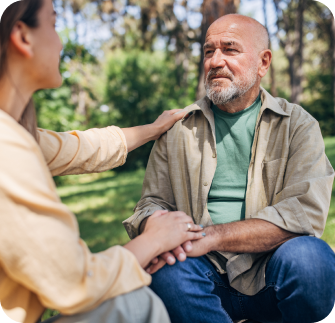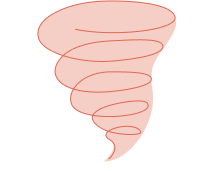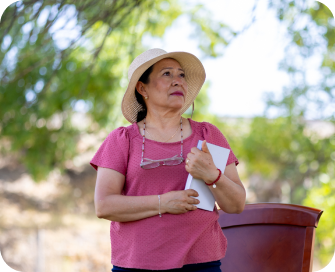
Coping with a cancer diagnosis
There’s no right or wrong way to process a cancer diagnosis. Your feelings are valid and we’re here to help you through them.
On this page:
Facing a cancer diagnosis
Everyone responds to a cancer diagnosis in their own way. You may have many feelings. These feelings may even conflict with each other—such as fear, numbness, and anger, among many others. Whatever you’re feeling, it is valid. There’s no right or wrong way to process a cancer diagnosis.
It’s normal to go through the “stages of grief,” which are common phases or feelings you may go through after something like a cancer diagnosis. Grief is personal and it does not follow any timelines or schedules. You may skip a stage of grief or come back to it later.
If you think you may be going through the stages of grief, here’s what you might expect at each stage and tips for getting through it.


Shock and denial
Getting a cancer diagnosis can be a shock. In the days and weeks after a diagnosis, you might feel foggy or hazy. Or, you might continue on as normal without much emotional response.
After the shock you might feel at first, you may go through a state of denial. This might mean ignoring or rejecting the diagnosis. This is normal. It’s one way your body might protect you from taking in too much overwhelming information at once. There is no rule book for when or how to get a cancer diagnosis, and accepting it at a slower pace is OK.

Anger and bargaining
As you continue to think about your diagnosis, you may start to feel angry about having cancer. Or, you may find yourself “bargaining.” This means asking yourself what you could have done differently to avoid cancer, or what you could do now or in the future to make it go away.
It’s OK to have these feelings. They’re a normal part of accepting your diagnosis.

Guilt and depression
When you think of “grief” you might think of this stage. It’s when you start to feel sadness. You might also feel guilty, like you’re becoming a burden to those around you.
This stage is different for everyone. You may prefer to be alone with your thoughts and feelings. Or you may feel you need a friend or loved one to help you.
If you need someone to talk to right away, you can always turn to the Suicide and Crisis Hotline (988) available 24 hours a day to provide comfort during difficult times.

Acceptance
The final stages of grief for most people involve accepting the situation and finding hope for the future. Here are some examples of how this stage might sound:
- “I cannot control that I got cancer, but I can control what I do next.”
- “This isn’t what I was expecting. But I’ve accepted it as my new reality.”
- “I am going to get through this, one way or another.”
- “My body is strong and I am willing to fight this.”
Grief can come in waves, and might sneak up on you every now and then. If it does, simply allow the feelings to wash over you. You can get through this moment.
Finding support and comfort
When you’re ready, consider reaching out to close friends or family to share your diagnosis. Here are some things to try that may help you find comfort as you’re processing a cancer diagnosis. Consider trying them when you’re ready:
- Journaling
- Meditation
- Going for a walk
- Spending time outside
- Joining an in-person support group near you
- Joining an online support group (such as Facebook Groups)
- Seeking help from a doctor, counselor, spiritual leader, or loved one
Learn more about building your care team and which professionals can give you emotional support.

Where can I find more cancer support?
Access resources that may help you during a cancer diagnosis, including how to find financial support, local childcare, transportation services, and other important resources.
US-KEY-08157 09/24




